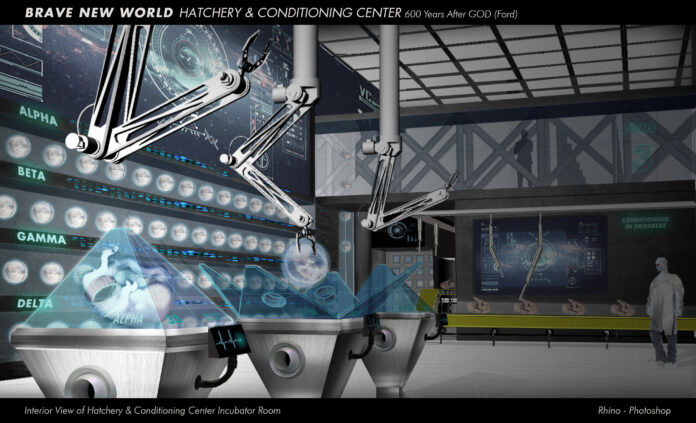The Ultimate Revolution and its Brave New World (first part) (English version at the end of this article)
Dacă ne gândim la evenimentele lumii moderne, ne dăm seama că le lipsește orice acțiune spontană. Revoluția Rusă și Germană au fost simple avataruri ale Revoluției Franceze. Precum monstrul lui Victor Frankenstein, aceste revoluții moderne, în loc să ne aducă așa-zisul „viitor luminos”, au scăpat de sub controlul liderilor lor politici și s-au încheiat prin regimuri totalitare.
Aceasta nu a fost cu siguranță Epoca de Aur mult așteptată. Mai degrabă Epoca lui Prometeu, a oamenilor ca zei (Men like Gods) jucându-se cu focul, prin războaiele pe care le-au adus lumii și inventarea bombei atomice. Din cauza acestor experiențe nefericite din trecut, Revoluția Digitală de astăzi mi se pare nu mai puțin terifiantă, chiar periculoasă decât cele care au fost înainte.
Aldous Huxley despre Revoluția Finală și viziunea sa asupra unei viitoare societăți totalitare
„Ceea ce este nevoie este un nou proiect Manhattan”, zicea Aldous Huxley. Care „în final ar face posibilă o extindere a libertății personale și o reducere a puterilor deținute de-o minoritate conducătoare”; și anume ar limita puterea unei elite oligarhice peste masele de oameni, bărbați și femei obișnuiți, neprivilegiați, care constituie majoritatea.
Dar vocea singulară a lui Huxley a fost cu greu auzită de elită. În răspunsul trimis la sondajul UNESCO privind fundamentele filozofice ale drepturilor omului, din iunie 1947, el ne-a avertizat cu privire la apariția unei noi dictaturi. Guvernul centralizat ar apărea similar altor dictaturi din secolul al XX-lea sub „presiunea crescândă a populației asupra resurselor și a ducerii, amenințării și pregătirii neîncetate pentru războiul total” (vezi Aldous Huxley, The Rights of Man and the Facts of the Human Situation, pe UNESCO Courier).
Dacă până acum fenomenele totalitare vizau doar unele colțuri ale lumii, într-un viitor nu prea îndepărtat totalitarismul va acapara întreaga lume. În interviul lui Mike Wallace, Aldous Huxley spune că tehnologia foarte avansată a viitorului și unele forțe impersonale vor conduce la această dictatură mondială pe care o preconizează că va veni din Statele Unite, la fel ca Serge Monast (Aldous Huxley interviewed by Mike Wallace: 1958 (Full), pe YouTube).
La Conferința de la Berkeley din primăvara anului 1962, susținea că toate revoluțiile trecute „au urmărit în esență schimbarea mediului pentru a schimba individul”; dar prin „Revoluția Supremă”, omul va acționa direct asupra minții-corpului semenilor săi. După Aldous Huxley, scopul ei este acesta: să dezvolte o serie întreagă de tehnici care va permite oligarhiei de control să standardizeze populația lumii într-un sistem științific de caste și să-i facă pe oameni să-și iubească servitutea (Aldous Huxley 1962 U.C. Berkeley Speech on “The Ultimate Revolution”, pe HYPERLINK „https://publicintelligence.net” https://publicintelligence.net).
Fabula sa, Brave New World, oferă o imagine vie a acestei dictaturi științifice a viitorului. Din anul 2540 d.Hr. (632 A.F. „După Ford”), care apare la scurt timp după Războiul de Nouă Ani sub deviza Statului Mondial: Comunitate, Identitate, Stabilitate. Narațiunea descrie o viitoare societate globalizată condusă de cei zece controlori mondiali și de legile economiei de piață. Interesant că scriitorul britanic plasează întreaga acțiune a poveștii în orașul Londrei care pare a fi centrul de putere al Statului Mondial (în această direcție, vezi documentarul lui Michael Chanan și Lee Salter, Secret City – A film about the City of London, the Corporation that runs it, pe YouTube ).
Fundalul unei fabule
Când a scris Brave New World, Huxley avea în vedere două lumi: una din Marea Britanie și o alta din SUA. Pe care le-a imaginat unificate sub o dictatură mondială. Scrierea între cele două războaie mondiale l-a făcut să se teamă că America ar putea cădea sub o dictatură iar, împreună cu ea, întreaga lume. Credea că viitorul Americii va fi viitorul lumii. Astfel de temeri erau destul de răspândite în aerul belle-époque:
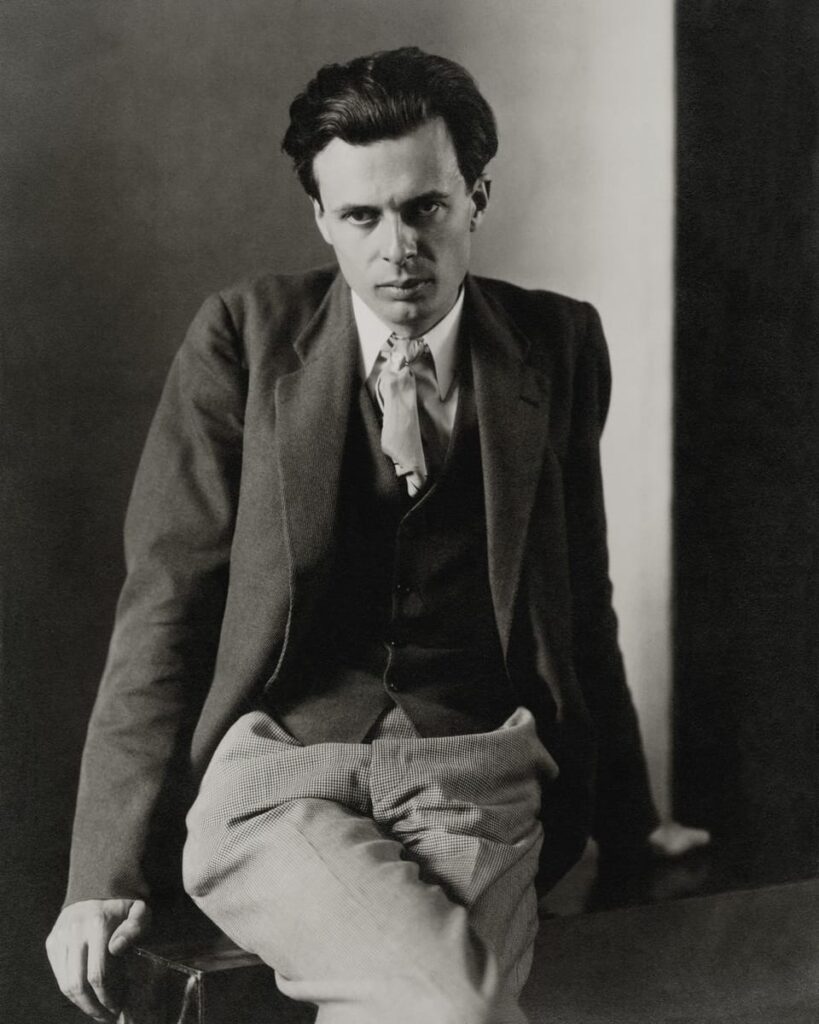
„Huxley însuși a prezis că una dintre cele mai nefericite consecințe ale Primului Război Mondial ar fi că dominația americană a lumii era inevitabilă. Nu a fost singurul de această părere; mulți intelectuali și scriitori s-au preocupat de grotescul, caricatura Americii”, mai ales după Crash-ul de pe Wall Street din octombrie 1929 (Doris Dier).
Marea Depresiune economică cerea ca lumea să fie scoasă din haos și pusă din nou în ordine. Unii dintre intelectuali, printre care și Huxley, susțineau că orice fel de ordine este mai bună decât haosul. Chiar dacă asta însemna remodelarea lumii după utopia unui idealist bolșevic, indistinctibilă de cea concepută după o fabrică Ford.
Proiectarea unei lumi noi și construirea ei pe ruinele celor vechi era discuția secolului. Scriitori futuriști ca H.G. Wells își imaginau o lume salvată printr-o revoluție tehnologică, prin știință și tehnica avansată. Dar acolo unde mulți vedeau mântuirea lumii, Huxley vedea pierderea ei sau ironia zeilor. Zeii râdeau acolo sus… O altă amenințare venea cu această evoluție: posibilitatea mult mai sinistră a unui război biologic, chiar nuclear.
Era prea iute la minte pentru a fi păcălit. Și dacă zeii râdeau de muritorii de rând, Aldous Huxley râdea și el de zei. Fabula sa a apărut așa, ca o ironie la romanul lui H.G. Wells, Men Like Gods (1923). El a prevăzut venirea unei dictaturi, dar pe-o cale mult mai ușoară decât cea descrisă de George Orwell în 1984, fără a folosi mijloacele torturii și ale durerii. Mai mult în modul în care H.G. Wells vedea viitorul omenirii în alte două cărți de-ale sale, The World of William Clissold (1926) și The Open Conspiracy: Blue Prints for a World Revolution (1928).
În The World of William Clissold (Book the Fifth: The Story of the Clissolds—The Next Phase), Wells scrie despre o republică mondială înființată de lideri de afaceri, politicieni, oameni de știință ș.a. În timp ce în The Open Conspiracy despre o „lume unificată din punct de vedere politic, social și economic” printr-o revoluție mondială. Realizată de către elită în numele prosperității, păcii universale și al fericirii, culminând cu stabilirea unei „comunități mondiale” (sat global), religia Lumii Noi (Wikipedia, The World of William Clissold și The Open Conspiracy).
Totuși, acest proiect al unei republici mondiale este mult mai vechi de un secol și a fost legat de cele mai mici orașe-state ale lumii: Vatican City (centrul religios), Corporation City of London (centrul financiar) și Washington D.C. (centrul militar). Astfel, Huxley era prea departe de adevăr când așezase Londra în centrul acțiunilor din BNW. Cu mențiunea că Londra nu este același lucru cu „Corporația”, o entitate economică separată legal de Marea Britanie (vezi 3 ‘City States’ Rule the World, pe YouTube).
Între paranteze fiind spus, nici H.G. Wells, nici Aldous Huxley nu erau deloc oameni obișnuiți. Erau Olimpieni, făceau parte din elită. Dar, spre deosebire de alții, Huxley a fost unul dintre cei mai onești intelectuali ai secolului trecut. Poate că știa ceva ce noi abia am aflat (vezi The Committee of 300, pe HYPERLINK „http://nwoogw.com/Committee-Of-300.html” http://nwoogw.com/Committee-Of-300.html).
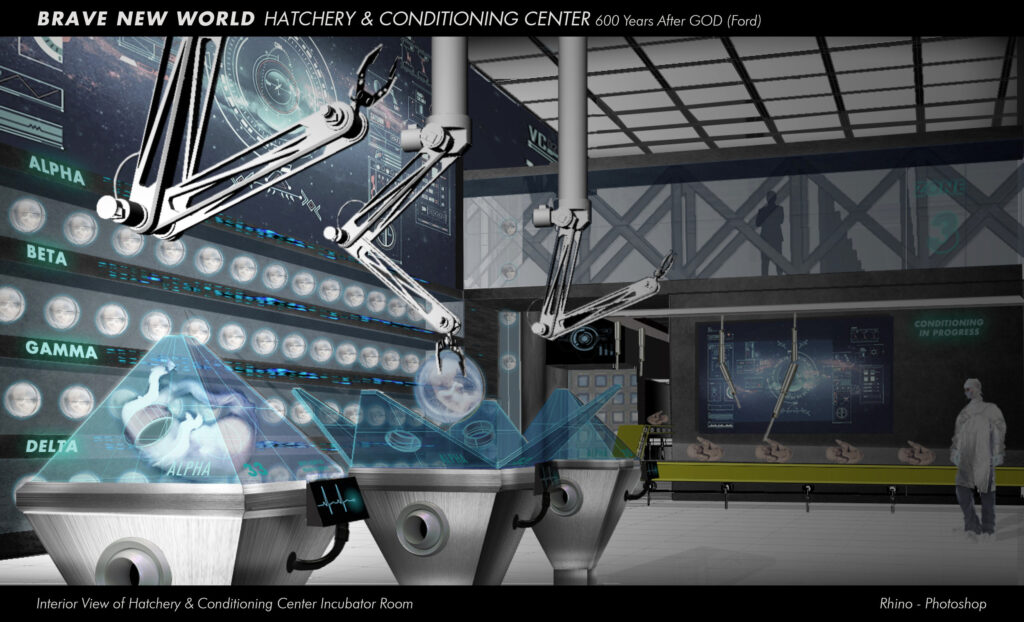
O dictatură mondială sub capitalism
Societatea BNW e o societate utopică. Care, la o privire fugitivă, pare a fi „lumea perfectă” locuită de „oameni perfecți”. „Cea mai bună dintre toate lumile posibile”, în cuvintele lui Leibniz. Literal, o utopie, tocmai asta înseamnă: locul bun dintr-o lume perfectă. Potrivit romanului lui Thomas Morus, Utopia, și Noua Atlantida a lui Francis Bacon, o utopie este starea ideală a unei societăți care există pe o insulă fictivă. Motivul utopiei a fost întotdeauna prezent în literatură care a imaginat lumi și societăți alternative dintr-un viitor îndepărtat, posibil (Doris Dier).
Utopiile au inspirat în secolul trecut nu numai scriitori prolifici ca H.G. Wells și Aldous Huxley. De asemenea, dictatori precum Stalin sau Hitler care vroiau să construiască o societate perfectă. Dar societatea fără clase a comuniștilor nu a fost o utopie mai bună ca societatea ariană a naziștilor. Ambele utopii și-au pierdut sensul pozitiv al termenului și au devenit în realitate o utopie negativă, și anume o distopie, locul rău din iad. Oricât de incredibil ar suna, rădăcinile lor pot fi găsite în idealurile iluministe.
Următoarea utopie după cele două războaie mondiale
În 1931-’32, când Huxley și-a scris fabula, exista doar o dictatură ușoară sub forma lui Mussolini. Așa că era liber să se gândească la alte metode de control decât cele descrise de Orwell în romanul 1984, chiar să-și imagineze un alt fel de utopie:
„Dar cred că, în măsura în care dictatorii devin din ce în ce mai științifici, din ce în ce mai preocupați de societatea perfectă din punct de vedere tehnic, care funcționează perfect, ei vor fi din ce în ce mai interesați de genul de tehnici pe care le-am imaginat și descris din realitățile existente în BNW. Astfel încât mi se pare că această revoluție supremă nu este chiar foarte departe, că avem deja o serie de tehnici pentru a realiza acest tip de control, sunt aici și rămâne de văzut când și unde și de către cine ele vor fi aplicate mai întâi la orice scară mare” (Aldous Huxley 1962 U.C. Berkeley Speech on “The Ultimate Revolution”, pe HYPERLINK „https://publicintelligence.net” https://publicintelligence.net).
După cele două războaie mondiale, multe state s-au afiliat la organizații internaționale precum Uniunea Interparlamentară (IPU), Liga Națiunilor (fr. Société des Nations) și UNESCO care promovau pacea mondială. Ideea unei republici mondiale instituită printr-o revoluție mondială nu a apărut doar în romanele (non-) fictive. În primul rând, a venit de la aceste întâlniri și conferințe internaționale unde se dezbătea ce fel de societate vor să construiască după războaie și de ce fel de oameni va fi ea locuită (vezi Wikipedia, The New World Order (Wells book). De asemenea Truthstream Media, 25 iul 2018).
Fabula lui Huxley anticipează această societate perfectă (sau următoarea utopie) pe care elita vroia să o construiască după cele două războaie mondiale. Sistemul economic din BNW nu este o economie planificată ca-n alte regimuri totalitare. Și chiar dacă se bazează pe producție și consum într-o așa-zisă „societate liberă”, Huxley o descrie mai degrabă ca pe-o utopie negativă ce are trăsăturile unei dictaturi tehnocrate sau ale unei societăți totalitare sub capitalism.
„Economia din „Brave New World” este capitalistă, nu există colectivism, ci proprietate privată, iar consumul este cea mai importantă bază a economiei. Dar, întrucât consumul este crescut artificial de către guvern, economia este, chiar dacă nu reglementată, cel puțin manipulată” (Alexandra Sirtl).
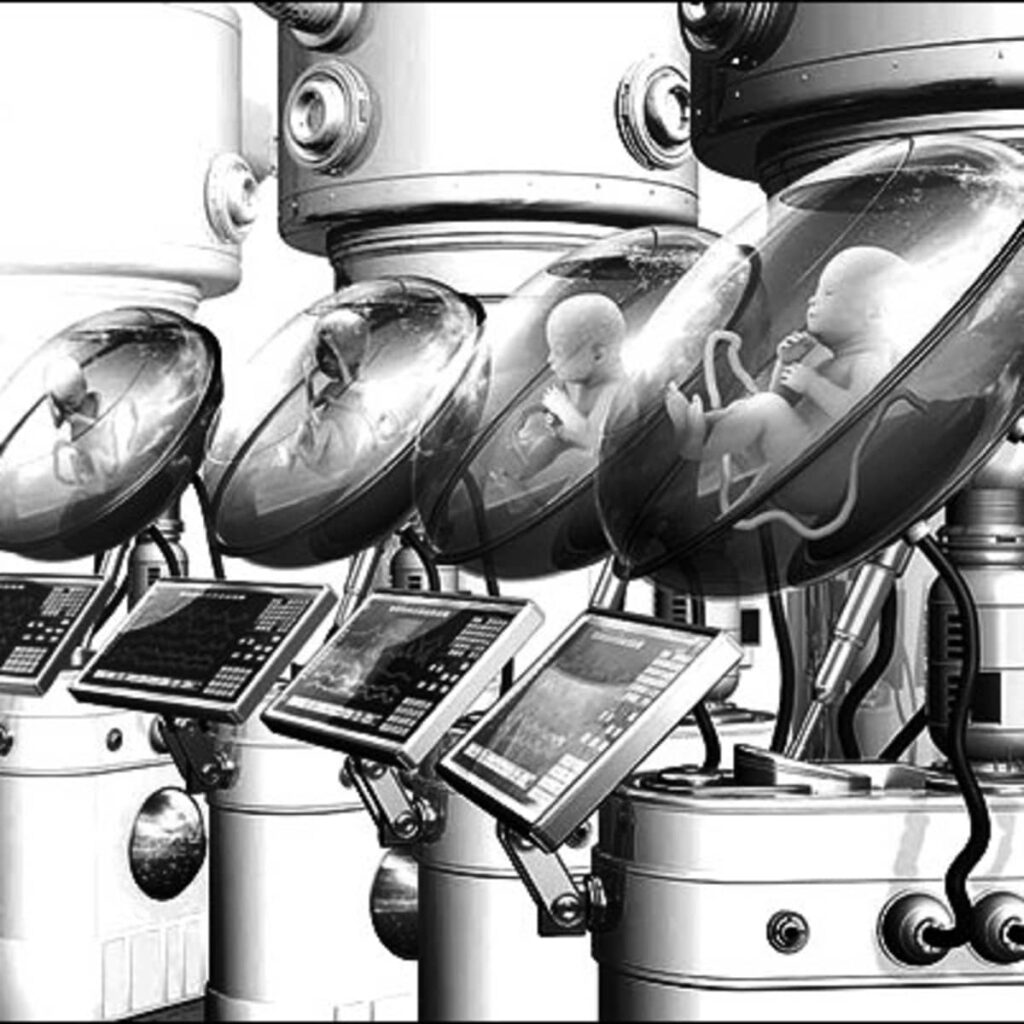
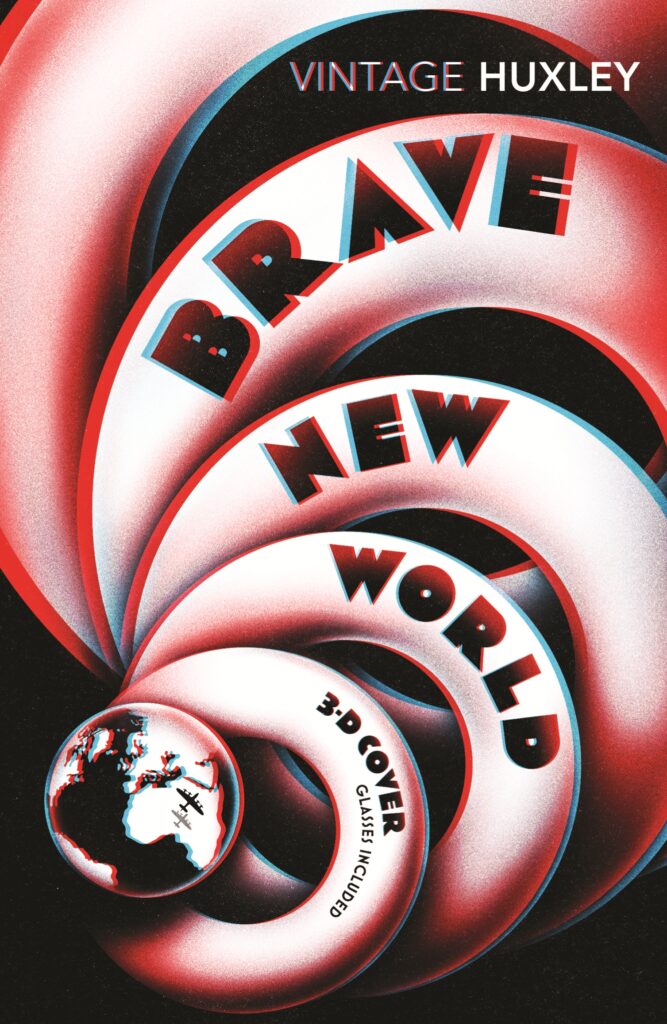
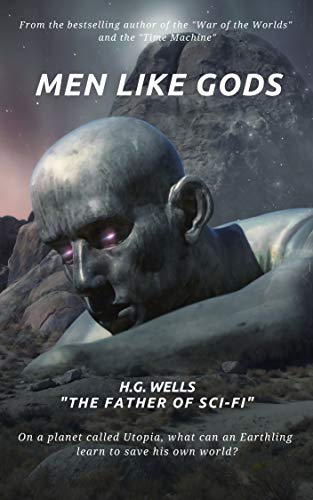
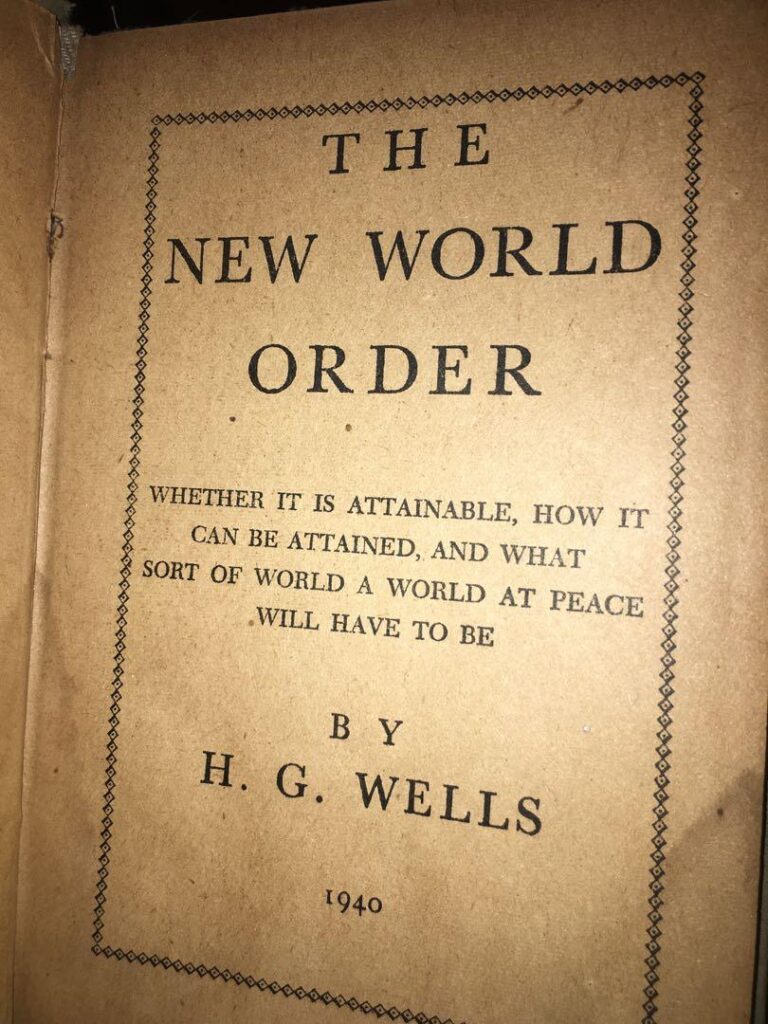
Brave New World și idolii ei
Henry Ford – părintele producției de masă – îl înlocuiește pe Dumnezeu în această societate, odată cu introducerea pe piață a primei sale mașini T-Model, aleasă ca dată de deschidere a unei noi ere. El și invenția lui devin zeii acestei lumi.
Propaganda statului mondial spune că consumul este benefic pentru societate, iar locuitorii sunt încurajați prin sugestii planificate să crească consumul de bunuri produse în masă. Fericirea nu mai este ceva pentru care să lupți, de cucerit, ci vine cu confortul și consumul de bunuri de lux. Astfel, uniformizarea se creează prin consum. Toată lumea se comportă la fel. Oamenii sunt făcuți să vadă această stare de fapt ca fiind cea mai mare fericire și să creadă în idealurile statului ca fiind ale lor.
În treacăt fie spus, nu acestea au fost cuvintele Președintelui Bush după 11 septembrie: „Ieși și cumpără?!” Mulțumită adevăratului Dumnezeu, nu lui Ford, Huxley nu a trăit atât de mult ca să le audă. Dacă ar fi trăit, ar fi râs. Acesta era modul în care îl vedea pe noul om al capitalismului, ca pe cel care iese și face mai multe cumpărături. Înrobit de marile corporații și de conducătorii lor, „totalitarismul inversat” al lui Sheldon Wolin (Wikipedia, Inverted totalitarianism).
Manipularea în masă merge atât de departe încât copiii sunt condiționați încă de la o vârstă foarte fragedă în Școala Somnului prin utilizarea metodelor pavloviene să urască florile și cărțile. Întrucât ele formează o individualitate și nu susțin economia statului. Îmi pot exprima propria personalitate numai prin gândurile și gusturile personale, altfel nu. Aș fi doar un om dintr-o mulțime. Ori, tocmai asta caută să distrugă statul lumii, și anume Sinele, sau persoana cu viața ei interioară. De aceea este condamnată solitudinea (Christiane).
În fiara aglomerată, oamenii acționează ca un singur om, „Omul unidimensional” al lui Herbert Marcuse, dar niciodată ca o persoană. Uniformizarea din Brave New World, chiar dacă nu se realizează prin folosirea unor metode brutale de control ca-n alte dictaturi, ea există. Controlul maselor se face într-un mod mult mai ușor, așa cum ar fi spus Huxley. Prin utilizarea metodelor psihologice de control al minții care cresc consumul și prin distracția oferită maselor.
Casa Propagandei, cu diferitele Birouri de Propagandă și Colegiul de Inginerie Afectivă, le spune oamenilor ce să le placă, ce să gândească și-n ce să creadă (BNW: Capitolul patru, § 2). Toți merg la cumpărături, iubesc tehnologia modernă a viitorului și tot ceea ce este nou după sloganul „Aruncatu-i mai bun ca reparatul!”
Joacă sporturi precum golful electromagnetic și golful cu obstacole. Spre deosebire de flori sunt scumpe și susțin economia statului. După muncă au întâlniri frecvente cu parteneri în schimbare – consecința educației statului și a acestei societăți de consum unde bărbații și femeile sunt tratați ca niște mărfuri. Merg la „The Feelies” (o nouă formă de cinema care anticipează într-un fel tehnologia 3D și orice ar putea apărea după) și, bineînțeles, oricând au chef iau medicamentul-minune „soma” (Jan M. Groth).
Toate acestea împreună cu Serviciile de Solidaritate (constituite ca o Mare Familie, Biserica Nouă) trebuiau să împlinească nevoile oamenilor; dar, în realitate, formează un sistem închis ca-n orice regim totalitar și au un singur scop: să distragă atenția oamenilor de la lipsa lor de libertate. Într-o oarecare măsură, aceste condiții de existență pot fi comparate cu cele ale Imperiului Roman. Unde despoții, tiranii ofereau maselor „Pâine și Circ” pentru a le controla mai bine.
Ca nimeni altcineva, Max Horkheimer a înțeles atât de bine originile sistemului total și cum funcționează: „Filmul, radioul, revistele formează un sistem. (…) Toate culturile de masă sînt identice sub apăsarea monopolurilor, iar scheletul lor, armătura conceptuală fabricată de monopoluri, începe să iasă la iveală”, de îndată ce-o puneți la îndoială (Max Horkheimer, Dialectica Luminilor: Industria culturală, pp. 140-141).
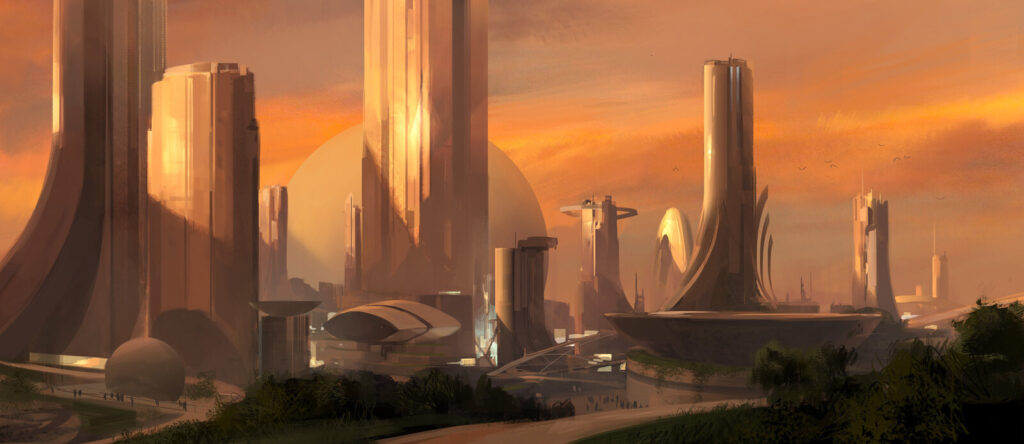
Oamenii sunt făcuți să urască tot ceea ce are legătură cu trecutul, lumea veche (artă, haine), dar nu și divertismentul pentru mase. În opoziție cu ceea ce ar putea arăta și fi prezentat ca o societate deschisă, în Brave New World nu există gândire liberă și libera alegere. Nici nu poate exista o societate liberă în care nimeni nu-și poate trăi sentimentele și gândurile. Societatea curajoasei lumi noi e o societate lipsită de dragoste. Toți seamănă cu morții care bântuie pe străzi, acei zombi din The Omega Man (1971) și Logan’s Run (1976).
„Nimeni nu este un individ „real” – comportamentul individual e unul dintre cele mai mari pericole căruia trebuie să-i facă față acest model de societate. Un fapt foarte important este controlul total al dezvoltării fiecărui membru al societății. Acest control nu începe cu nașterea oamenilor, fiecare își are locul în societate înainte de a se naște. Oamenii nu se reproduc în mod normal. Sunt produși în fabrici mari” ca bunurile pentru larg consum (Christiane).
Când Huxley a vizitat Statele Unite, a văzut toate aceste tendințe negative manifestate într-o societate de consum și a prevăzut că acest lucru va răsturna toate valorile moștenite, după vorba lui Nietzsche. Le va goli de orice conținut real și le va transforma în valori de suprafață. Că această revoluție supremă care a început cu producția de masă și consumismul introduse de Henry Ford va fi ca spectrul unei fantome care se va răspândi în întreaga lume.
Revoluția Digitală Supremă, o rampă de lansare pentru o lume populată cu roboți?
În Centrul de Incubaţie şi Condiţionare pentru Londra Centrală, oamenii sunt crescuți industrial în sticle pe liniile de asamblare în laboratoare uriașe. Aici, statul lumii își produce proprii cetățeni (membri ai societății) prin utilizarea ingineriei biologice. Cunoștințele foarte avansate de biochimie și inginerie genetică permit lucrătorilor științifici să manipuleze genomul uman folosind biotehnologia. Astfel încât, ei produc oameni standardizați care vor fi plasați într-un sistem științific de caste în care au sarcini foarte specifice de îndeplinit în societate.
Un birou al Guvernului Mondial numit „Predestinatorii” înregistrează cererile iar apoi sunt produși artificial oameni cu calități specifice. Alfa și Beta, cei mai inteligenți dintre cetățeni, sunt crescuți în sticle ca-ntr-un pântec artificial. În timp ce Gamma, Delta și Epsilon (mai puțin inteligenți) prin cea mai recentă tehnologie, Procesul Bokanovsky. Care face posibilă producerea de nouăzeci și șase de embrioni identici cu aceeași structură genetică, un proces pe care astăzi l-am numi clonare. Aceștia sunt tipuri, nu indivizi. Deci, oamenii nu sunt uniformi doar în ceea ce privește modul în care gândesc, ci și-n felul în care arată potrivit locului lor în acest sistem de caste. Chiar dacă se realizează prin diversitate tot uniformizare poate fi numită (Franziska Caesar).
Am putea spune că nu sunt nici măcar oameni, ci simple automate. Ideea Omului Mecanic a apărut pentru prima dată în cărți precum cea a lui Julien Offray de La Mettrie, L’homme machine („Man a Machine”, 1747), care a servit drept trambulină pentru teoria evoluției și teoria computațională a minții a lui Alan Turing de mai târziu; sau în romanul gotic Frankenstein al lui Mary Shelley („The Modern Prometheus”, 1818). În cinematografie, ecranizări precum Gattaca (1997), Matrix (1999), I, Robot (2004), I Am Mother (2019) abordează, de asemenea, ideile de inginerie genetică, utere artificiale mergând atât de departe până la o lume populată cu roboți.
Dar un robot nu este un el sau o ea, doar un lucru printre lucruri, sclavul perfect. În Brave New World, Huxley nu abordează în mod direct suprapopularea globală. Cu toate acestea, politica adoptată de Statul Mondial din fabula sa este, evident, o politică malthusiană de creștere zero a populației prin educația oferită cetățenilor săi și cele mai recente evoluții din inteligența artificială. Astfel, nașterea artificială pare să fie soluția pe care cei zece controlori mondiali o oferă la această problemă chiar dacă nu este discutată în mod explicit (Michelle Klein).
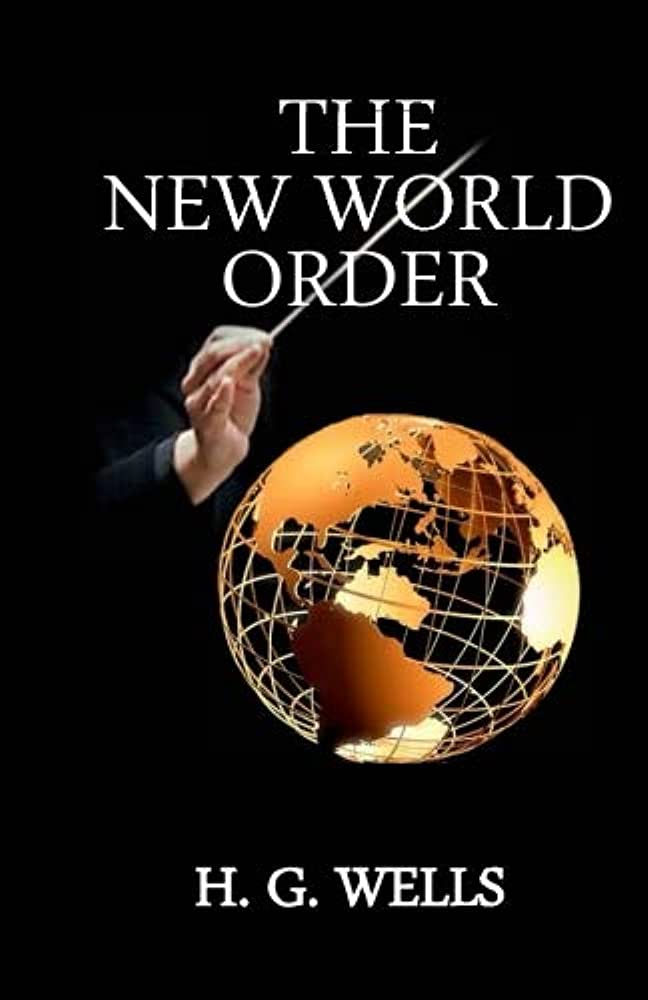
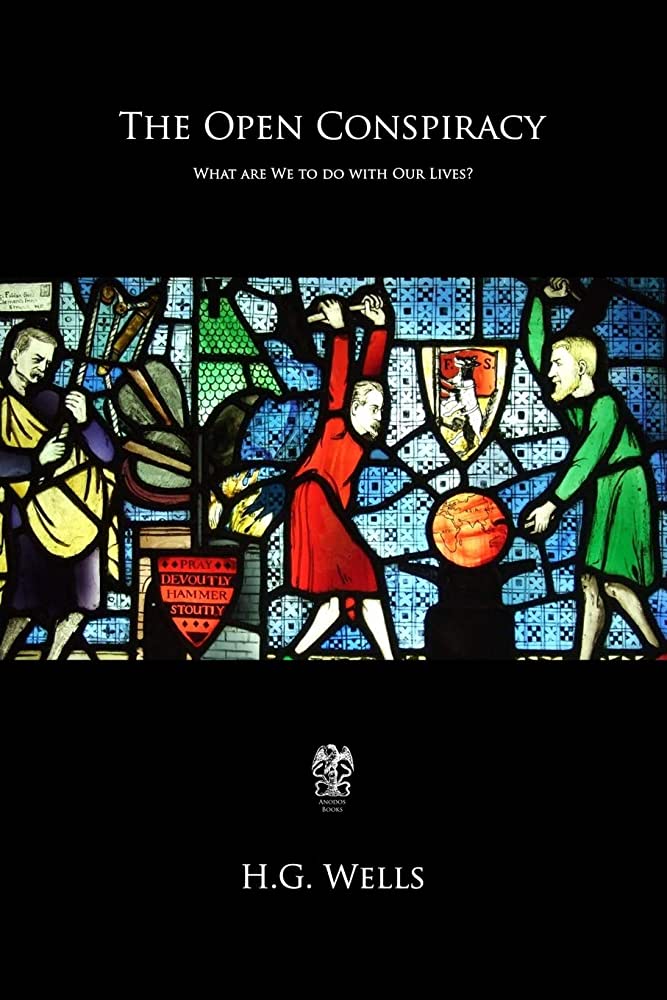
Referitor la aceasta, Huxley a ridicat două întrebări foarte bune, încă relevante astăzi, la Conferința de la Berkeley și-n răspunsul trimis către UNESCO: 1) „Ce s-ar întâmpla dacă aceste tehnici fantastic de puternice ar fi folosite de oameni fără scrupule cu autoritate, ce s-ar întâmpla atunci, ce fel de societate am avea?” 2) „Mai exact, cât de bine este ca un om de știință sau tehnolog să participe la lucrări al căror rezultat va fi creșterea concentrării puterii în mâinile minorității conducătoare și să ofere soldaților mijloacele pentru exterminarea în masă a civililor?” Până acum știința aplicată fusese în mare parte în slujba unei elite oligarhice, a marilor afaceri, iar apoi a guvernului care a făcut posibil statul totalitar modern (vezi Aldous Huxley 1962 U.C. Berkeley Speech on “The Ultimate Revolution” și The Rights of Man and the Facts of the Human Situation).
Nu știm dacă mâine vom trăi într-o lume atât de bizară dominată de roboți (sau androizi umani) cum ne spun scenariile de la Hollywood. Dar ultimele evoluții din inteligența artificială (IA) ne arată că acest viitor ar putea fi posibil. Fapt care-l face pe Aldous Huxley să fie un om cu o viziune terifiantă, după cum l-a numit Mike Wallace în interviul său. Care a anticipat atât de bine cele mai recente evoluții din IA, revoluția digitală de astăzi și orașele inteligente de mâine (vezi Human-like robot „wakes up” as UK company unveils android Ameca, pe YouTube).
În cele din urmă, tot ce pot spune este că mă îndoiesc, la fel de mult ca și Huxley, cu privire la această glorioasă Revoluție Supremă și viitorul strălucit pe care l-ar putea aduce; sau, la fel cum John Milton s-a îndoit de Imperiul lui Satan în paradisul său pierdut:
Doubted his Empire, that were low indeed,
That were an ignominy and shame beneath
(„M-am îndoit de Imperiul său, care era într-adevăr jos,
Era o ignominie și o rușine dedesubt”).
– John Milton, Paradise Lost (Book 1)
Ana-Maria Caminski
Corespondent in Romania, pentru NASUL TV Canada
The Ultimate Revolution and its Brave New World (first part)
If we think about modern world events, we realize they lack any spontaneous actions. The Russian and German Revolutions were mere avatars of the French Revolution. Like Victor Frankenstein’s monster, these modern revolutions, instead of bringing us the so-called ‘bright future’, have gotten out of control of their political leaders and ended by totalitarian regimes.
This was not certainly the long-awaited Golden Age. Rather the Prometheus Age, of Men like Gods playing with fire, by the wars they’ve brought to the world and the invention of the atomic bomb. Because of these unfortunate past experiences, today’s Digital Revolution seems to me no less terrifying, even dangerous than those that were before.
Aldous Huxley on the Ultimate Revolution and his vision of a future totalitarian society
“What is needed is a new Manhattan Project”, said Aldous Huxley. Which “finally it would make possible an extension of personal liberty and a reduction of the powers wielded by the ruling minority”; namely, it would limit the power of an oligarchical elite over the masses of ordinary, unprivileged men and women who constitute the majority.
But the singular voice of Huxley hardly was heard by the elite. In the sent response to UNESCO’s survey on the philosophical foundations of human rights, from June 1947, he warned us of the rise of a new dictatorship. The centralized government would appear similarly to other 20th-century dictatorships under “the increasing pressure of population upon resources and the waging, threat of, and unremitting preparation for, total war” (see Aldous Huxley, The Rights of Man and the Facts of the Human Situation, on UNESCO Courier website).
If until now the totalitarian phenomena regarded only some corners of the world, in the not-too- distant future totalitarianism will take over the entire world. In Mike Wallace’s interview, Aldous Huxley says that the very advanced technology of the future and some impersonal forces will drive up to this world dictatorship that he foresees upcoming from the United States, same as Serge Monast (Aldous Huxley interviewed by Mike Wallace: 1958 (Full), on YouTube).
At the Berkeley Conference in the spring of 1962, he argued that all the past revolutions “have essentially aimed at changing the environment in order to change the individual”; but by ‘the Ultimate Revolution’, man will act directly on the mind-body of his fellows. After Aldous Huxley, its goal is precisely this: to develop a whole series of techniques that will enable the controlling oligarchy to standardize the world population into a scientific caste system and make people love their servitude (Aldous Huxley 1962 U.C. Berkeley Speech on “The Ultimate Revolution”, on HYPERLINK „https://publicintelligence.net” https://publicintelligence.net).
His fable, Brave New World, offers a vivid image of this scientific dictatorship of the future. From the year AD 2540 (632 A.F. ‘After Ford’), that appears soon after the Nine Years War under the World State’s motto: Community, Identity, Stability. The narration describes a future globalized society, ruled by the Ten World Controllers and the laws of the market economy. Interesting that the British writer places the whole story action in the City of London, which seems to be the World State’s center of power (in this direction, see the documentary of Michael Chanan and Lee Salter, Secret City – A film about the City of London, the Corporation that runs it, on YouTube).
The Background of a Fable
When he wrote Brave New World, Huxley had in regard two worlds: one from the UK and another from the US. Which he envisioned unified under a world dictatorship. Writing between the two world wars made him fear that America might fall under a dictatorship and, together with it, the whole world. He thought that the future of America would be the future of the world. Such fears were quite widespread in the air of belle-époque:
“Huxley himself predicted that one of the most unfortunate consequences of WWI would be that American world domination was inevitable. He was not the only one of that opinion; many intellectuals and writers concerned themselves with the grotesquerie of America”, especially after the Wall Street Crash of October 1929 (Doris Dier).
The Great Depression demanded the world be taken out of chaos and placed into order again. Some of the intellectuals, among whom was Huxley, claimed that any kind of order is better than chaos. Even if that meant reshaping the world after a Bolshevik idealist’s utopia, indistinguishable from that designed after a Ford factory.
The designing of a new world and building it on the ruins of the old ones was the talk of the century. Futuristic writers like H.G. Wells imagined a world saved through a technological revolution, by science and advanced technique. But where many saw the salvation of the world, Huxley saw its loss or the irony of the gods. The gods were laughing high above… Another threat came with this development: the far more sinister possibility of biological, even nuclear, warfare.
He was too quick-witted to be fooled. And if the Gods laughed at ordinary mortals, Aldous Huxley laughed at the Gods too. His fable was born just like that, as an irony to the H.G. Wells’ novel, Men Like Gods (1923). He foresaw the coming of a dictatorship but in a much lesser way than that described by George Orwell in 1984, without using the means of torture and pain. More in the way that H.G. Wells saw the future of mankind in two other of his books, The World of William Clissold (1926) and The Open Conspiracy: Blue Prints for a World Revolution (1928).
In The World of William Clissold (Book the Fifth: The Story of the Clissolds—The Next Phase), Wells writes about a World Republic established by business leaders, politicians, scientists, and others. While in The Open Conspiracy on a ‘world politically, socially, and economically unified’ through a world revolution. Done by the elite in the name of prosperity, universal peace, and of happiness, culminating with the establishment of a ‘world commonwealth’ (global village), the New World’s religion (Wikipedia, The World of William Clissold and The Open Conspiracy).
Yet this project of a World Republic it’s much older than a century and has been related to the smallest cities-states of the world: Vatican City (religious center), Corporation City of London (financial center), and Washington D.C. (military center). Thus, Huxley was not too far from the truth when placed London at the center of actions in BNW. Mentioning that London it’s not the same as the ‘Corporation’, an economic entity legally separate from the UK (see the 3 ‘City States’ Rule the World, on YouTube).
Between brackets being said, neither H.G. Wells nor Aldous Huxley were by no means ordinary men. They were Olympians, made part of the elite. But, unlike others, Huxley was one of the most honest intellectuals of the last century. Maybe he knew something that we’ve bearly found out (see The Committee of 300, on HYPERLINK „http://nwoogw.com/Committee-Of-300.html” http://nwoogw.com/Committee-Of-300.html).
A world dictatorship under capitalism
The Brave New World’s society is a utopian society. Which, at a fleeting glimpse, seems to be the ‘perfect world’ lived by ‘perfect men’. ‘The best of all possible worlds’, in the words of Gottfried Leibniz. Literally, a utopia, precisely that it means: the good place from a perfect world. According to Thomas Morus’ novel Utopia and Francis Bacon’s New Atlantis, a utopia it’s an ideal state of society that exists on a fictional island. The utopia motif has always been present in literature which imagined alternative worlds and societies from a distant, possible future (Doris Dier).
Utopias inspired in the last century not only prolific writers like H.G. Wells and Aldous Huxley. Also, dictators such as Stalin or Hitler who wanted to build a perfect society. But the classless society of the Communists was no better utopia than the Aryan society of the Nazis. Both utopias lost the positive meaning of the term and have become in reality a negative utopia, namely a dystopia, the bad place in hell. No matter how unbelievable might sound, their roots can be found in the Enlightenment ideals.
The next utopia after the two World wars
In 1931-’32, when Huxley wrote his fable, there was only a mild dictatorship in the form of Mussolini in existence. So he was free to think about other methods of control than those described by Orwell in 1984 novel, even to imagine another kind of utopia:
“But I think that insofar as dictators become more and more scientific, more and more concerned with the technically perfect, perfectly running society, they will be more and more interested in the kind of techniques that I imagined and described from existing realities in BNW. So that it seems to me then, that this ultimate revolution is not really very far away, that we already have a number of techniques for bringing about this kind of control, are here, and it remains to be seen when and where and by whom they will first be applied in any large scale” (Aldous Huxley 1962 U.C. Berkeley Speech on “The Ultimate Revolution”, on HYPERLINK „https://publicintelligence.net” https://publicintelligence.net).
After the two world wars, many states affiliated with international organizations such as the Inter-Parliamentary Union (IPU), League of Nations (fr. Société des Nations), and UNESCO that promoted world peace. The idea of a World Republic established by a World Revolution did not appear only in (non-) fictional novels. First of all, it came from these international meetings and conferences where they debated what kind of society they wanted to build after the wars and what kind of people it would be inhabited by (see Wikipedia, The New World Order (Wells book). Also Truthstream Media, Jul 25, 2018).
Huxley’s fable anticipates this perfect society (or the next utopia) that the elite wanted to build after the two world wars. The economic system of Brave New World it’s not a planned economy like in other totalitarian regimes. And even if it’s based on production and consumption in a so-called ‘free society’, Huxley describes it more like a negative utopia that has all the features of a technocratic dictatorship or totalitarian society under capitalism.
“The economy in ‘Brave New World’ is capitalist, there is no collectivism, but private property, and consumption is the most important basis of the economy. But as consumption is artificially increased by the government, the economy is, even if not regulated, at least manipulated” (Alexandra Sirtl).
Brave New World and its idols
Henry Ford – the father of mass production – replaces God in this society, with the introduction of his first T-Model machine on the market, chosen as the opening date of a new era. He and his invention become the gods of this world.
The World State’s propaganda says that consumption is beneficial to society, and the inhabitants are encouraged by planned suggestions to increase the consumption of mass-produced goods. Happiness is no longer something to fight for, to conquer, but comes with comfort and the consumption of luxury goods. Thus, uniformization is created through consumption. Everybody acts the same. People are made to see this state of an affair as the greatest happiness and believe in the state’s ideals as being their own.
Let it be said in passing, not those were the words of President Bush after 9/11: ‘Go out and shop?!’ Thanks to the real God, not Ford, Huxley did not live so much to hear it. If he would have lived, he would have laughed. This was the way he viewed the new man of capitalism, as the one that goes out and shops more. Enslaved by the big corporations and their rulers, the ‘inverted totalitarianism’ of Sheldon Wolin (Wikipedia, Inverted totalitarianism).
The mass manipulation goes so far that children are conditioned from a very young age in the Sleep School by using Pavlovian methods to hate flowers and books. Because they form an individuality and don’t support the state’s economy. I can only express my own personality through my personal thoughts and tastes, otherwise not. I would be just a man from a crowd. Or, precisely this is what the World’s State seeks to destroy, namely the Self, or the person with her inner life. That’s why solitude it’s condemned (Christiane).
In the crowded beast, people act as a single man, the ‘One-Dimensional Man’ of Herbert Marcuse but never as a person. Uniformization from Brave New World, even if it is not achieved through the use of brutal methods of control as in other dictatorships, it exists. The control of the masses is made in a much easier way, as Huxley would have said. By using psychological methods of mind control that increase consumption and by the entertainment given to the masses.
The Propaganda House, with its various Bureaux of Propaganda and the College of Emotional Engineering, tells the people what to like, what to think, and what to believe in (BNW: Chapter Four, § 2). They all go shopping, love the modern technology of the future and everything that’s new after the slogan ‘Ending is better than mending!’
Play sports like Electro-Magnetic Golf and Obstacle Golf. Unlike flowers, these are expensive and support the state’s economy. After work, they have frequent encounters with changing partners – a consequence of the state’s education and of this consumer society in which men and women are treated like commodities. Go to ‘the Feelies’ (a new form of cinema that in a way anticipates the 3D technology and anything that might appear after), and, of course, whenever they feel like they take the wonder-drug ‘soma’ (Jan M. Groth).
All this together with the Solidarity Services (constituted as a Great Family, the New Church) were supposed to fulfill people’s needs; but, in reality, they form a closed system like in any totalitarian regime and have one purpose: to distract the people’s attention from their lack of freedom. To some extent, these conditions of livelihood can be compared to those of the Roman Empire. Where despots, tyrants offered to the masses ‘Bread and Circus’ in order to better control them.
Like nobody else, Max Horkheimer understood so well the origins of the total system and how it works out: “Film, radio, magazines form a system. (…) All mass cultures are identical under the pressure of the monopolies, and their skeleton, the conceptual armor manufactured by the monopolies, begins to emerge”, as soon as you question it (Max Horkheimer, Dialectic of Enlightenment: Cultural industry, pp. 140-141).
People are made to hate everything that’s related to the past, the old world (art, clothes), but not the entertainment for the masses. Contrary to what might look like and be presented as an open society, in Brave New World there’s no such thing as free thinking and free choice. There cannot be a free society where nobody can live out his feelings and his thoughts. BNW society is a loveless society. They are all alike the walking dead on the streets, those zombies from The Omega Man (1971) and Logan’s Run (1976) movies.
“Nobody is a ‘real’ individual – individual behavior is one of the greatest dangers this model of society has to cope with. One very important fact is the complete control of the development of each member of society. This control does not start with the birth of the people, everyone gets his place in the society before he or she is born. People don’t reproduce in the normal way. They are produced in big factories” as goods for mass consumption (Christiane).
When Huxley visited the United States, he saw all these negative tendencies manifested in a consumerist society and foresaw that this will overthrow all the past values, after Nietzsche’s old saying. It will empty them of any real content and transform them into surface values. That this Ultimate Revolution which began with mass production and consumerism introduced by Henry Ford will be like the specter of a ghost that will spread throughout the world.
The Digital Ultimate Revolution, a springboard for a world populated by robots?
In the Central London Hatchery and Conditioning Centre, humans are industrially bred in bottles on assembly lines in huge laboratories. Here, the world’s state produces its own citizens (members of the society) by the use of biological engineering. The very advanced knowledge of biochemistry and genetic engineering permits scientific workers to manipulate the human genome by using biotechnology. Such that, they produce standardized people that will be placed into a scientific caste system where they have very specific tasks to fulfill in society.
A World Government bureau called the ‘Predestinators’ registers the requests and then people with specific qualities are artificially produced. Alphas and Betas, the most intelligent of citizens, are bred in bottles like in an artificial womb. While Gammas, Deltas, and Epsilons (less intelligent) through the latest technology, the Bokanovsky-Process. That makes it possible to produce ninety-six identical embryos with the same genetic structure, a process that today we would call cloning. Those are types, not individuals. So, people are not only uniform regarding how they think but also in the way they look according to their place in this caste system. Even if it’s achieved through diversity still uniformize can be called (Franziska Caesar).
We could say that they are not even humans but mere automatons. The idea of the Mechanic Man first appeared in books like that one of Julien Offray de La Mettrie, L’homme machine (‘Man a Machine’, 1747), which served as a springboard to the Evolution theory and the much later Computational theory of mind of Alan Turing; or in the Gothic novel Frankenstein of Mary Shelley (‘The Modern Prometheus’, 1818). In cinematography, screenings like Gattaca (1997), Matrix (1999), I, Robot (2004), I Am Mother (2019) approach, as well, the ideas of genetic engineering, artificial wombs going so far up to a world populated by robots.
But a robot is not a he or she, just a thing among things, the perfect slave. In Brave New World, Huxley does not directly address global overpopulation. However, the policy adopted by the World State from his fable it’s obviously a Malthusian policy of Zero Population Growth (ZPG) through the education offered to their citizens and the latest developments in AI. Thus, artificial birth seems to be the solution the Ten World Controllers offers on this issue even if it is not explicitly discussed (Michelle Klein).
Regarding this, Huxley raised two very good questions, still relevant today, at the Berkeley Conference and in the sent response to UNESCO: 1) ‘What might happen if these fantastically powerful techniques were used by unscrupulous people in authority, what on Earth would happen, what sort of society would we get?’ 2) ‘Specifically, how far is it right for the scientist or technologist to participate in work, the outcome of which will be to increase the concentration of power in the hands of the ruling minority and to provide soldiers with the means for the wholesale extermination of civilians?’ Until now applied science had been largely in the service of an oligarchic elite, big business, and then the government that made the modern totalitarian state possible (see Aldous Huxley 1962 U.C. Berkeley Speech on “The Ultimate Revolution” and The Rights of Man and the Facts of the Human Situation).
We don’t know if tomorrow we’ll live in such a bizarre world dominated by robots (or human androids) as the Hollywood scenarios tell us. But the latest developments in artificial intelligence (AI) show us that this future could be possible. A fact that makes Aldous Huxley to be a man of a terrifying vision, as Mike Wallace has called him in his interview. Who anticipated so well the latest developments in AI, the Digital Revolution of nowadays, and the smart cities of tomorrow (see Human-like robot „wakes up” as UK company unveils android Ameca, on YouTube).
In the end, all I can say is that I doubt, as much as Huxley did, regarding this glorious Ultimate Revolution and the bright future it might bring; or, the same how John Milton doubted Satan’s Empire in his lost paradise:
Doubted his Empire, that were low indeed,
That were an ignominy and shame beneath
– John Milton, Paradise Lost (Book 1)
References
3 ‘City States’ Rule the World, May 11, 2013. YouTube.
Chanan, Michael, and Lee Salter. Secret City – A film about the City of London, the Corporation that runs it, April 29, 2014. YouTube.
Dykes, Aaron, and Melissa. Selfish Ledger: A Talking Cricket, a Self-Writing Quill, and the Coming Hive Mind. USA: Truthstream Media, Jul 25, 2018. YouTube.
Global News. Human-like robot „wakes up” as UK Company unveils android Ameca, Dec 3, 2021. YouTube.
GRIN. Sirtl, Alexandra. Brave New World – … as a negative utopia. Germany, Munich: Grin Verlag Publishing, 1998. Web.
GRIN. Christiane (Author). Brave New World – A perfect society? Germany, Munich: Grin Verlag Publishing, 2000. Web.
GRIN. Groth, Jan M. Brave New World – Entertainment for the Masses. Germany, Munich: Grin Verlag Publishing, 2001. Web.
GRIN. Caesar, Franziska. Conditioning in Aldous Huxley’s ‘Brave New World’. Germany, Munich: Grin Verlag Publishing, 2010. Web.
GRIN. Dier, Doris. The Motifs of Utopia and Dystopia in Aldous Huxley’s ‘Brave New World’. Germany, Munich: Grin Verlag Publishing, 2012. Web.
GRIN. Klein, Michelle. Ecocriticism on Human Genetic Engineering in Aldous Huxley’s ‘Brave New World’. Germany, Munich: Grin Verlag Publishing, 2016. Web.
Horkheimer, Max, Theodor W. Adorno. Dialectica Luminilor: fragmente filozofice. România, Iași: Editura Polirom, 2012. Print.
Huxley, Aldous. The Rights of Man and the Facts of the Human Situation (or ‘Defeating the enemies of freedom’). Paris: UNESCO, June 1947. Web.
Huxley, Aldous. The Ultimate Revolution. USA: Berkeley Language Center, March 20, 1962. Transcript published by Public Intelligence, on August 12, 2010. Web.
Huxley, Aldous. Brave New World: And, Brave New World Revisited. New York: Harper Perennial Modern Classics, 2005. Print.
Huxley, Aldous. Minunata lume nouă: Și, Reîntoarcere în minunata lume nouă. Iași: Polirom, 2011. Print.
Huxley, Aldous. Aldous Huxley interviewed by Mike Wallace: 1958 (Full). Posted on Sep 28, 2011. YouTube.
Wikipedia. The World of William Clissold. Web.
Wikipedia. The Open Conspiracy. Web.
Wikipedia. The New World Order (Wells book). Web.
Wikipedia. One-Dimensional Man. Web.
Wikipedia. Inverted totalitarianism. Web.


